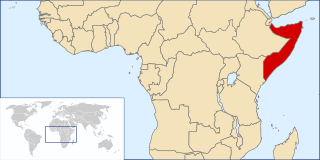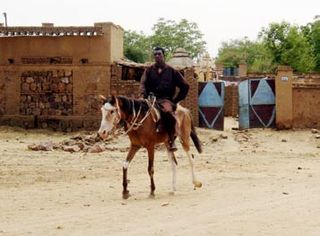
United Nations Security Council resolution 1284, adopted on 17 December 1999, after recalling previous relevant resolutions on Iraq, including resolutions 661 (1990), 687 (1991), 699 (1991), 707 (1991), 715 (1991), 986 (1995), 1051 (1996), 1153 (1998), 1175 (1998), 1242 (1999) and 1266 (1999), the council established the United Nations Monitoring, Verification and Inspection Commission (UNMOVIC) to replace the United Nations Special Commission (UNSCOM). It was the final resolution adopted in 1999.
The ISIL (Da'esh) and Al-Qaida Sanctions Committee is a committee of the United Nations Security Council tasked with implementing international sanctions against the Islamic State and al-Qaeda. It was established as the Al-Qaida and Taliban Sanctions Committee on 15 October 1999, pursuant to Security Council Resolution 1267, which designated al-Qaeda and the Taliban as terrorist organizations. Following the creation of a separate Taliban Sanctions Committee on 17 June 2011, it was renamed the Al-Qaida Sanctions Committee. The scope of the sanctions regime was expanded to include the Islamic State on 17 December 2015 pursuant to Resolution 2253.

United Nations Security Council Resolution 1907, adopted on December 23, 2009, imposed an arms embargo on Eritrea, travel bans on its leaders, and froze the assets of some of the country's political and military officials after accusing the Eritrean government of aiding Al-Shabaab in Somalia and reportedly refusing to withdraw troops from its disputed border with Djibouti, following a conflict in 2008. The African Union and other organisations had been calling on the Security Council to sanction Eritrea for several months.

United Nations Security Council Resolution 1916, adopted unanimously on March 19, 2010, after recalling resolutions 733 (1992), 1519 (2003), 1558 (2004), 1587 (2004), 1630 (2005), 1676 (2006), 1724 (2006), 1744 (2007), 1766 (2007), 1772 (2007), 1801 (2008), 1811 (2008), 1844 (2008), 1853 (2008), 1862 (2009), 1894 (2009) and 1907 (2009), the Council extended the term of the Monitoring Group for 12 months and expanded its mandate to include the monitoring of the arms embargo on Eritrea in addition to Somalia.

United Nations Security Council resolution 1374, adopted unanimously on 19 October 2001, after reaffirming Resolution 864 (1993) and all subsequent resolutions on Angola, particularly resolutions 1127 (1997), 1173 (1998), 1237 (1999), 1295 (2000), 1336 (2001) and 1348 (2001), the council extended the monitoring mechanism of sanctions against UNITA for a further six months until 19 April 2002.

United Nations Security Council resolution 1558, adopted unanimously on 17 August 2004, after recalling previous resolutions on the situation in Somalia, particularly resolutions 733 (1992) and 1519 (2003), the Council re-established a group to monitor the arms embargo against the country for a further six months.

United Nations Security Council resolution 1587, adopted unanimously on 15 March 2005, after recalling previous resolutions on the situation in Somalia, particularly resolutions 733 (1992), 1519 (2003) and 1558 (2004), the council re-established a group to monitor the arms embargo against the country for a further six months.

United Nations Security Council Resolution 1972 was adopted unanimously on 17 March 2011. After recalling previous resolutions on the situation in Somalia, particularly resolutions 733 (1992), 1844 (2008) and 1916 (2010), the Council authorised an ease on its assets freeze relating to humanitarian operations in the country for 16 months.

United Nations Security Council resolution 1630, adopted unanimously on 14 October 2005, after recalling previous resolutions on the situation in Somalia, particularly resolutions 733 (1992), 1519 (2003), 1558 (2004) and 1587 (2005), the council re-established a group to monitor the arms embargo against the country for a further six months and condemned the increase in flow of weapons to the country in violation of the embargo.

United Nations Security Council Resolution 1982, adopted unanimously on May 17, 2011, after recalling all previous resolutions on the situation in Sudan, the Council extended the mandate of an expert panel monitoring the arms embargo and other sanctions against the country until February 19, 2012.

United Nations Security Council Resolution 1676, adopted unanimously on May 10, 2006, after recalling previous resolutions on the situation in Somalia, particularly resolutions 733 (1992), 1519 (2003), 1558 (2004), 1587 (2005) and 1630 (2006), the Council re-established a group to monitor the arms embargo against the country for a further six months.

United Nations Security Council Resolution 1708, adopted unanimously on September 14, 2006, after recalling previous resolutions on the situation in Côte d'Ivoire, particularly resolutions 1572 (2004), 1584 (2004), 1633 (2005) and 1643 (2005), the Council prolonged the mandate of an expert group monitoring an arms embargo against the country until mid-December 2006.

United Nations Security Council Resolution 1724, adopted unanimously on November 29, 2006, after recalling previous resolutions on the situation in Somalia, particularly resolutions 733 (1992), 1519 (2003), 1558 (2004), 1587 (2005), 1630 (2006) and 1676 (2006), the Council re-established a group to monitor the arms embargo against the country for a further six months and condemned an increase in the flow of weapons to the country.

United Nations Security Council Resolution 2002, adopted unanimously on July 29, 2011, after recalling resolutions 733 (1992), 1519 (2003), 1558 (2004), 1587 (2004), 1630 (2005), 1676 (2006), 1724 (2006), 1744 (2007), 1766 (2007), 1772 (2007), 1801 (2008), 1811 (2008), 1844 (2008), 1853 (2008), 1862 (2009), 1907 (2009), 1916 (2010) and 1972 (2011), the Council tightened sanctions against Eritrea and Somalia to include individuals and entities recruiting or using child soldiers in the Somali Civil War, in addition to those responsible for attacks against schools and hospitals in Somalia.
United Nations Security Council Resolution 1766 was unanimously adopted on 23 July 2007.
United Nations Security Council Resolution 1853 was unanimously adopted on 19 December 2008.
United Nations Security Council Resolution 1811 was unanimously adopted on 29 April 2008.

United Nations Security Council Resolution 2060 was unanimously adopted on 25 July 2012.

United Nations Security Council Resolution 2093 was unanimously adopted on 6 March 2013.














